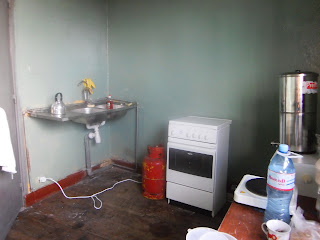Debre Birhan is a relatively small town north east of the capital, about 117km from Addis. It is over 2800 metres above sea level which means it is an area of high altitude. It is known as one of the coldest places in Ethiopia. Daytime temperatures are are warm if not hot throughout the year; however temperatures fall sharply at night. Since I’ve been here we have had beautiful, blazing sunshine. At night I wrap up warm in bed with two thick blankets - which happen to be locally made as there is a blanket factory in town!
Debre Birhan has a small university as well as the oldest teachers training college which is about fifty years old.
My house is in the compound of the college which is huge! I got lost in it on the way to another house (– however this probably isn’t surprising to those that know my sense of direction). College teachers who do not have their own housing live on the compound.
In my house I have a bedroom, a kitchen, a living room and a bathroom. I was very surprised to find a gas cooker and a fridge in my kitchen when I arrived. They were left behind by whoever lived in this house before me. There is also an 'injera' (Ethiopian flat bread) cooker. One day I might give it a try…..
I love the fact that I am surrounded by beautiful fields and a river. The views are amazing from where my house is.
There are a few local shops near to where I am, but to get to the centre of Debre Birhan is a bit of a walk, maybe 25 minutes. There is a small market every day, but a bigger market every Saturday.
Since I arrived I have spent most of my time cleaning my house. Teaching in the college will start in two weeks so I have some time to sort myself out, and get to know the place and meet people.
The people I have met have been extremely generous and kind to me. I have been invited to neighbours’ houses for lunch and dinner every day since I arrived.











